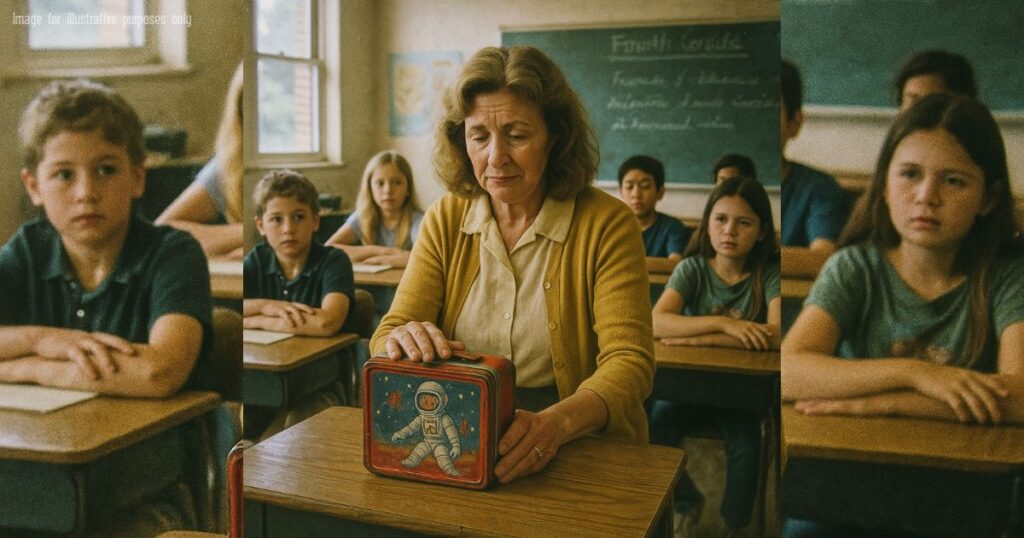I called the counselor with my list.
I spoke quietly. I used no drama. Then I locked the classroom and walked the long hallway that smelled like crayons and end of day. In the parking lot I paused beneath the flag that did not move. A hush had settled over the building, the strange peace of a place that has spent all of its noise.
That night I took the lunchbox home.
I set it on my kitchen table and made tea in my battered blue kettle.
I ate toast with butter and, for the first time in a long time, did not turn on the television. I ran my fingers along the dent near the handle and remembered the girl I had been. A girl who worried about kickball and penmanship and whether her friend would sit with her on the bus.
I felt no shame for that girl. Children deserve small worries. The shame belongs to the grown world that forgets to protect their right to have them.
I took a blank stone and wrote a word for myself. Listen. I dropped it into the lunchbox and the sound was a small bell.
The next morning I arrived even earlier. I taped a sign above the board.
Is it heavy today
Under the question I drew two hands.
Not fancy art.
Just palms open, fingers out, the shape children draw when they trace their own. The chalk left white dust on the sleeve of my sweater, and I did not brush it off.
When the class came in, they stopped and read it. No one laughed. No one made a face. They hung up their coats and dropped their stones and found their seats.
I held up a book for our read aloud, a story where a child keeps a secret in his pocket until it burns a hole and light comes through. I started to read. Halfway down the first page, Mark raised his hand.
“Yes,” I said.
“Can we have a thing,” he asked, frowning at the rug, “like when one of us cannot lift but we cannot say why. Like a signal.”
I thought of every meeting I had ever sat through about data and goals.
I thought of how much of teaching is about things you can see and count. Then I nodded.
“Here is our signal,” I said.
“You place your pencil down. That is all. We will pause as a class for ten breaths. You do not have to look at anyone. You do not have to explain. We will hold the weight with you.”
They tested it in a kind of game.
A pencil here.
Ten breaths.
A pencil there.
Ten more. The room learned how to get quiet and then return without fear. It was a beautiful trick that cost nothing but attention.
At the afternoon pick up, parents waited in their clusters with tired faces.
I sent home a note that said we are practicing how to name heavy and light.
It did not say more. Some things you cannot write in a note. Some things must be lived in the steady length of days.
Before I turned off the lights, I checked the jars. Heavy was fuller than Light. It will be for a while. That is honest.
I opened the lunchbox and saw the stones and papers and the word I had written last night. Listen. I touched it with my fingertip.
“Tomorrow,” I told the room, “we will learn the difference between silence and quiet.”
The clock ticked. The hallway sighed. I closed the lid.
The weight was still weight, but it was in our hands now. And hands, when they learn to lift together, are stronger than anything that tries to make a child small.
Thank you so much for reading this story!
I’d really love to hear your comments and thoughts about this story — your feedback is truly valuable and helps us a lot.
Please leave a comment and share this Facebook post to support the author. Every reaction and review makes a big difference!
This story is a work of fiction created for entertainment and inspirational purposes. While it may draw on real-world themes, all characters, names, and events are imagined. Any resemblance to actual people or situations is purely coincidenta


